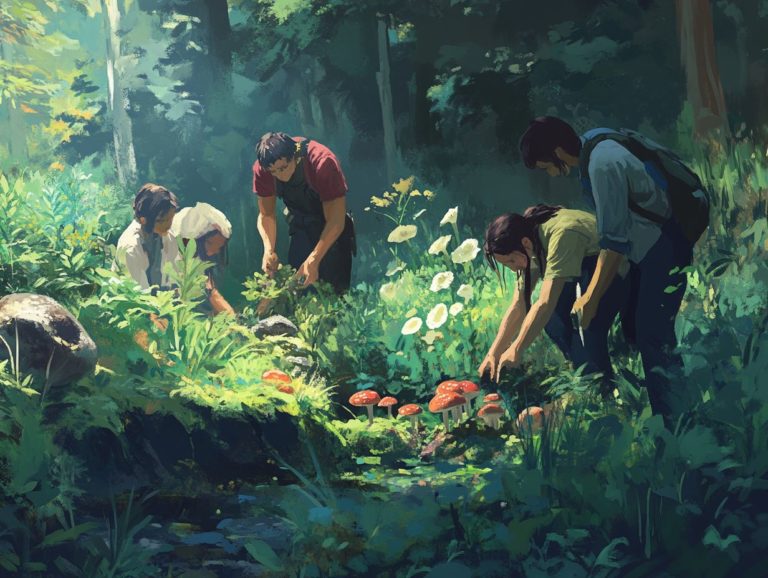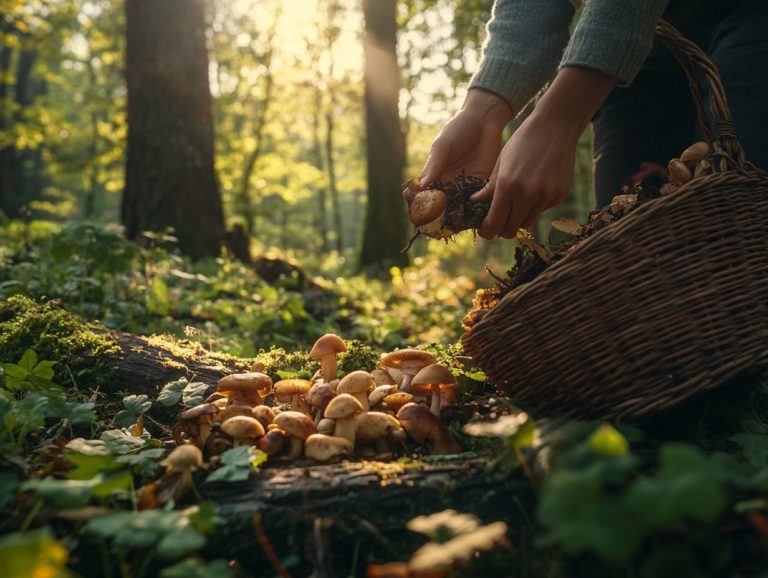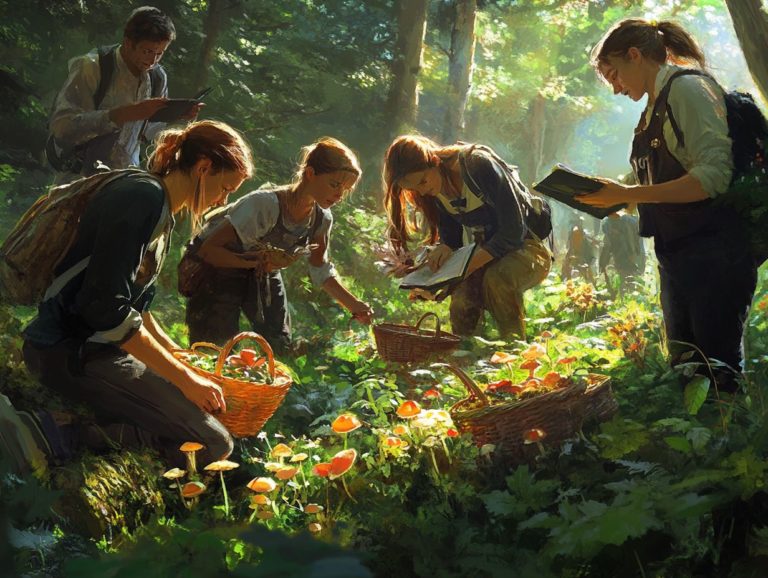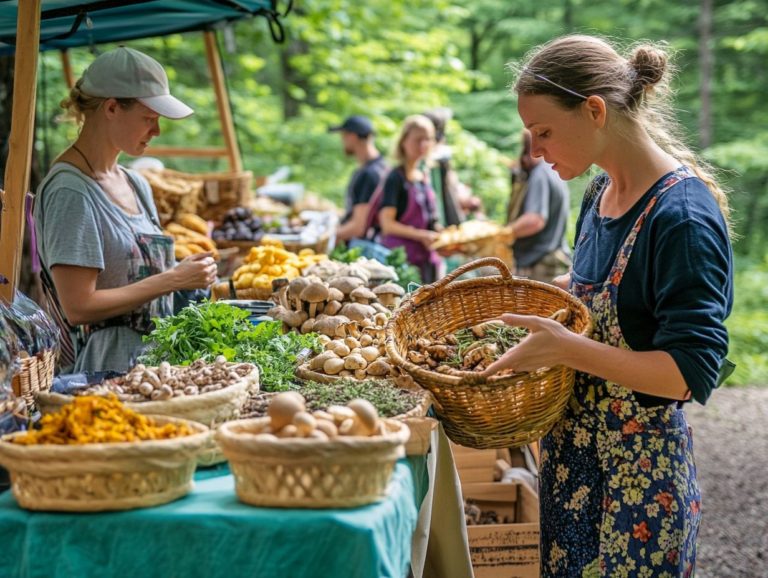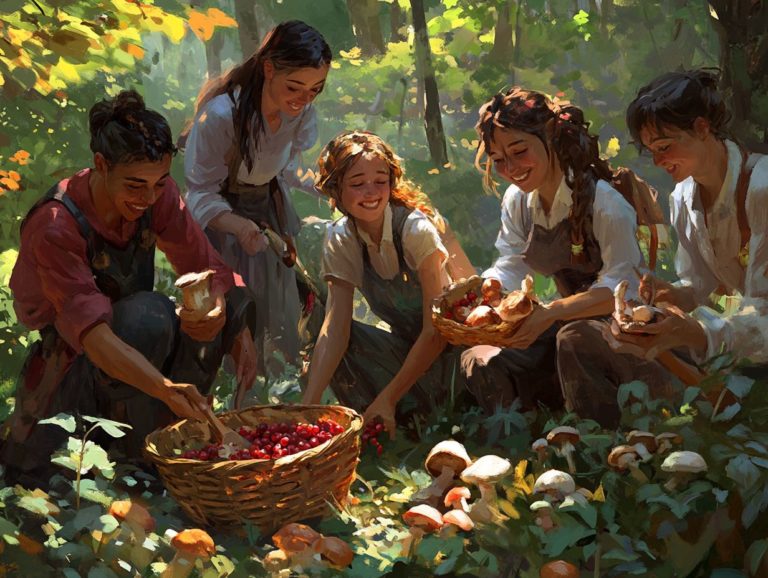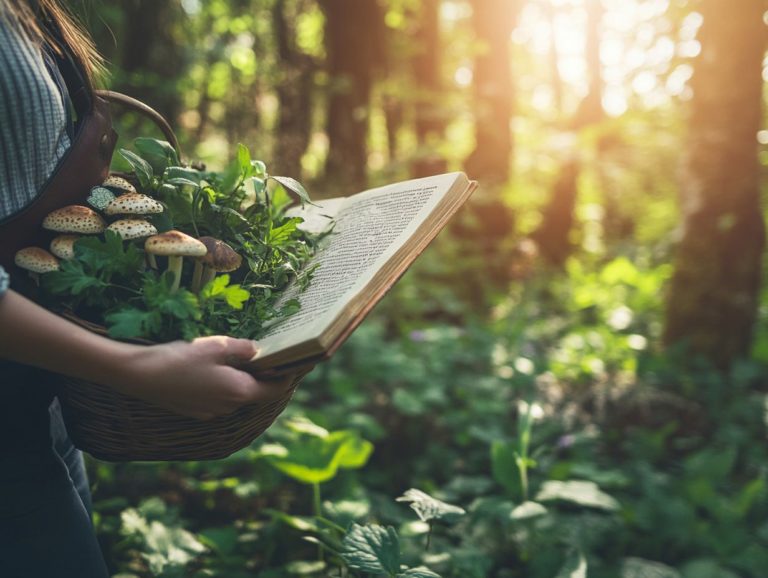How to Stay Updated on Foraging Events
Foraging events present an opportunity to get closer to nature, connect with fellow enthusiasts, and learn useful skills. Whether you re an experienced forager or simply curious to explore the world of food herbs, attending these events will deepen your understanding of local ecosystems and the edible plants that thrive within them.
This article will guide you through the benefits of foraging events, how to locate and prepare for them, what to expect during your experience, and tips for remaining engaged with the vibrant foraging community. Don’t miss out!
Get ready for an exciting adventure into foraging and explore the nutritional value of wild food!
Contents
- Key Takeaways:
- Benefits of Attending Foraging Events
- How to Find Foraging Events
- Preparing for a Foraging Event
- What to Expect at a Foraging Event
- Staying Updated on Foraging Events
- Frequently Asked Questions
- What are foraging events and why should I stay updated on them?
- How can I find out about upcoming foraging events in my area?
- Are there any websites or apps specifically for finding and keeping track of foraging events?
- What should I bring to a foraging event?
- Do I need to have prior foraging experience to attend an event?
- How can I stay safe while foraging at an event?
Key Takeaways:
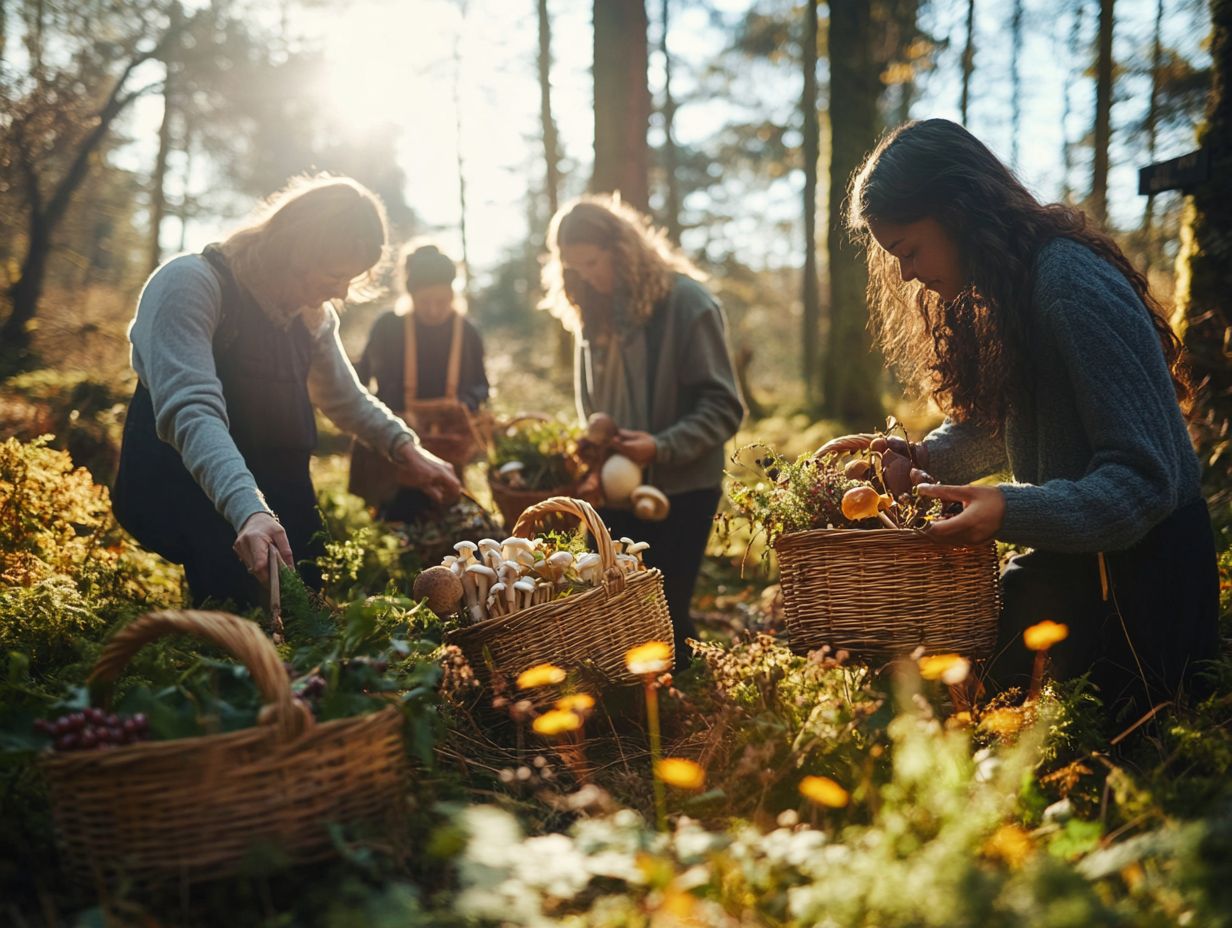
- Stay connected with nature and community by attending foraging events.
- Expand your foraging knowledge and skills by attending events.
- Stay updated on foraging events by subscribing to newsletters, following social media, and networking with other foragers, including joining online groups and engaging with YouTube content.
What are Foraging Events?
Foraging events provide you with an immersive opportunity to connect with nature, discover edible plants and fungi, and engage with a lively community of fellow foragers who share a passion for wild food. These gatherings are not just about identifying wild edibles; they place a strong emphasis on ethical foraging practices, which means taking only what you need and preserving the environment. This ensures you learn how to harvest responsibly and how to preserve use.
Whether you re a beginner forager or an experienced forager, events range from skill-building workshops to guided foraging walks, all while highlighting the nutritional benefits and historical significance of local plant species and the best identification techniques.
You can participate in hands-on workshops where experts share the nuances of sustainable gathering techniques. These are methods that protect the plants and ensure they grow back for future foragers. Guided walks allow you to explore local ecosystems, deepening your appreciation for biodiversity and the different plant families present in your environment. These experiences build friendships and encourage sharing knowledge among like-minded individuals, reinforcing the importance of preserving nature s bounty for future generations.
By adhering to ethical standards and ethical collection methods, you contribute to the health of the environment, ensuring that wild resources remain abundant and accessible for everyone. This not only enhances your connection to the land but also enriches your understanding of its offerings.
Benefits of Attending Foraging Events
Attending foraging events offers you a wealth of benefits, including the chance to connect with nature, acquire new skills, and deepen your understanding of wild edible plants, fungi, and the art of cooking wild food.
Whether you re just starting out or already an experienced enthusiast, these events will elevate your identification skills and broaden your knowledge of the nutritional value and historical significance of various food herbs. You’ll gain the confidence to ethically harvest and collect green plants right in your local area, becoming more proficient in identifying characteristics of various flora.
Connecting with Nature and Community
Connecting with nature and community is one of the most rewarding aspects of attending foraging events and developing your primitive living skills. Foraging refers to searching for and gathering wild food. As you gather with others, you share knowledge, experiences, and a genuine love for wild edible plants, including tips on identifying trees and mushrooms in the southeast.
Engaging with like-minded individuals fosters friendships and strengthens the foraging community, creating a network of wild food enthusiasts eager to learn from each other. Beginner foragers can learn from seasoned foragers, exchanging invaluable insights into local flora, ethical practices, and wild food preparation techniques.
These gatherings encourage you to explore your local environments together, deepening your understanding of ecosystems the complex interactions between living organisms and their environments while appreciating the subtleties of seasonal growth and the edible abundance present in each season.
By nurturing these connections, you can engage with both local and online communities, joining social media groups or attending foraging workshops that offer resources, tips, and recipes, including details about cooking techniques for wild food.
Sharing your discoveries through community newsletters or foraging blogs enhances your personal experiences and inspires others to reconnect with nature. Your discoveries can inspire others to join the fun of reconnecting with nature.
Learning New Skills and Knowledge
Foraging events provide an exceptional opportunity to learn new skills and gain valuable insights into wild edible plants, mushrooms, and how to harvest them responsibly.
As you immerse yourself in this fascinating realm, you’ll master the art of plant identification, honing techniques to recognize distinguishing features like leaf shapes, flower arrangements, and scents, particularly using mushroom guides and field guides. This experience transcends mere identification and encompasses ethical harvesting practices that highlight sustainability and a profound respect for nature.
By exploring the historical context of foraging from ancient culinary traditions to contemporary movements you will deepen your appreciation for the cultural significance and nutritional benefits of wild foods, including common milkweed and Autumn Olive. Engaging with the land in this manner nurtures a sense of stewardship, inviting you to connect with your environment while enriching your diet with nutrient-rich, foraged ingredients.
How to Find Foraging Events
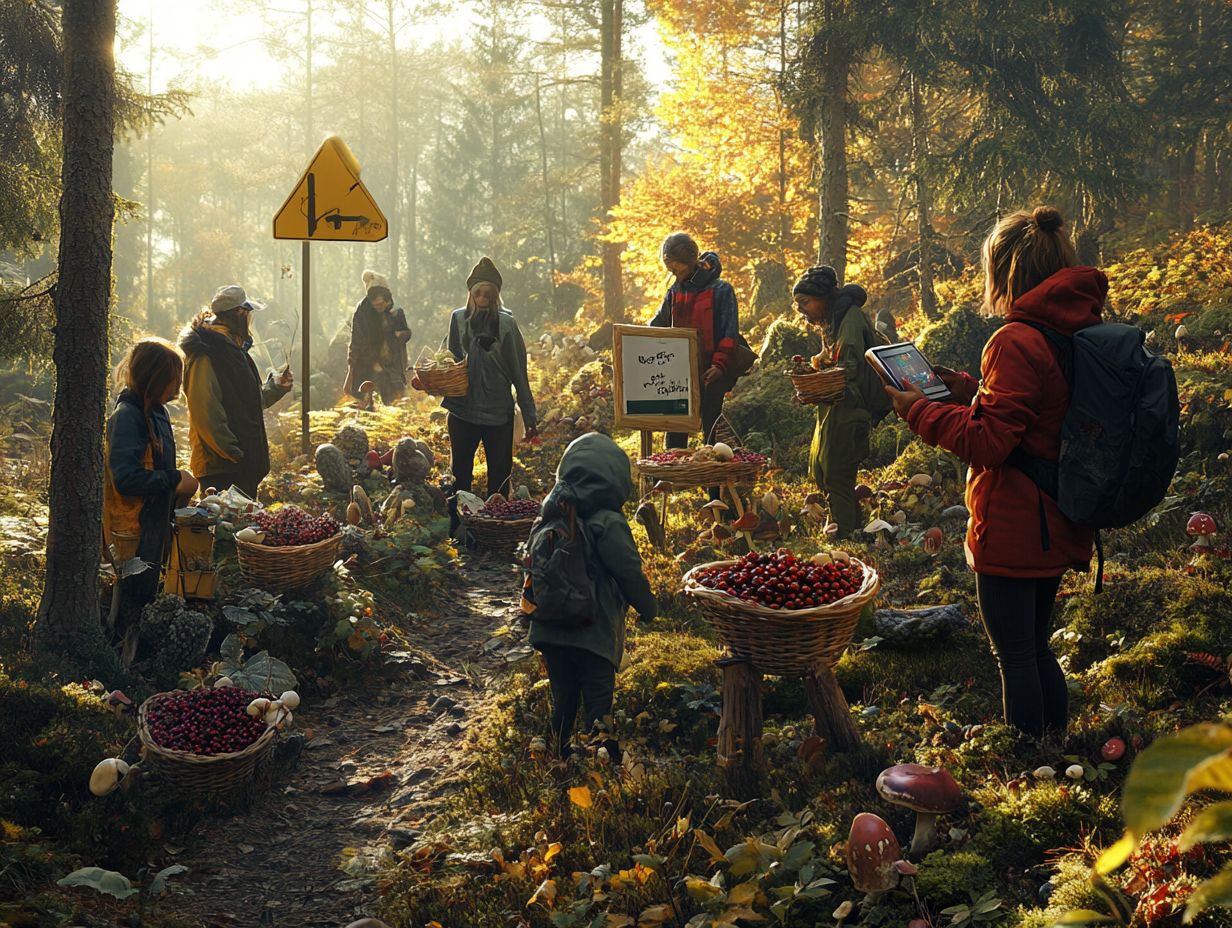
Discovering foraging events has never been more accessible, thanks to the proliferation of online resources and local organizations dedicated to wild food education.
Platforms like Facebook and Reddit, along with specialized websites like Feral Foraging and community bulletin boards, offer a treasure trove of opportunities. Whether you’re a novice forager looking to expand your knowledge or seeking engaging workshops and gatherings, there s a wealth of classes available, including foraging classes that teach best identification practices to cater to every skill level.
Embrace the adventure of learning and connect with fellow enthusiasts along the way.
Join a foraging event today and experience the joy of discovering wild foods together!
Online Resources and Local Organizations
Utilizing online foraging resources and local organizations is an excellent way to stay informed about top local foraging events, workshops, and classes.
Websites like Feral Foraging and groups such as the North Alabama Foraging Club offer event schedules and educational materials for beginner foragers.
Platforms like Facebook groups and Reddit forums, particularly r/foraging, create welcoming spaces for wild food enthusiasts to share experiences, tips, and personal foraging stories.
These virtual communities provide real-time advice and foster connections with fellow foragers exploring the same local areas.
Local organizations frequently host hands-on workshops where you can learn directly from experienced foragers.
This deepens your understanding of the ecosystem and teaches you how to harvest safely.
Engaging in these platforms and events enriches your knowledge and promotes responsible foraging, strengthening bonds within the vibrant local foraging community.
Preparing for a Foraging Event
Preparing for a foraging event requires a thoughtful approach focused on essential supplies and crucial safety measures.
This ensures a successful and enriching experience involving ethical collection.
As a new forager, arm yourself with a reliable identification guide, such as the field guide Mushrooms of the Gulf Coast States, and the tools for ethical harvesting.
It’s also important to familiarize yourself with local regulations regarding the collection of wild plants and fungi.
Learning how to harvest safely is vital for the health of the ecosystem and enhances your personal safety during this adventurous pursuit.
Understanding the identifying characteristics of local flora is crucial.
Essential Supplies and Safety Measures
Essential supplies for your foraging adventure include a reliable identification guide, a sturdy basket to hold your finds, and safety gear like gloves and a first-aid kit.
Tools for cooking wild food are also recommended.
Taking precautions, such as letting someone know your whereabouts, enhances your experience while keeping it responsible.
Consider packing a notebook to jot down observations, and a camera to capture the stunning beauty of nature.
Understanding the local ecosystem enables you to make informed decisions while foraging.
It also helps you appreciate the historical use of various species within the environment.
Practicing ethical collection methods ensures that the plants you gather continue to thrive.
This approach promotes rich biodiversity and sustainability, keeping habitats undisturbed.
Engaging with your foraging community can yield valuable insights about seasonal changes, common milkweed locations, and the best safe spots to forage.
By prioritizing sustainability and respecting nature, you elevate your own experiences and contribute to preserving natural habitats for future generations.
What to Expect at a Foraging Event
At a foraging event, get ready for exciting activities that will deepen your appreciation for wild edibles.
These include cooking wild food and learning about their nutritional value, while connecting with fellow foragers.
The itinerary usually features guided walks through local green spaces and immersive workshops that teach you the art of harvesting.
Captivating cooking demonstrations reveal how to transform wild food into culinary delights using techniques shared by experts like Tom Brown and Samuel Thayer.
These experiences are designed to elevate your journey into the world of wild cuisine.
Activities and Schedule
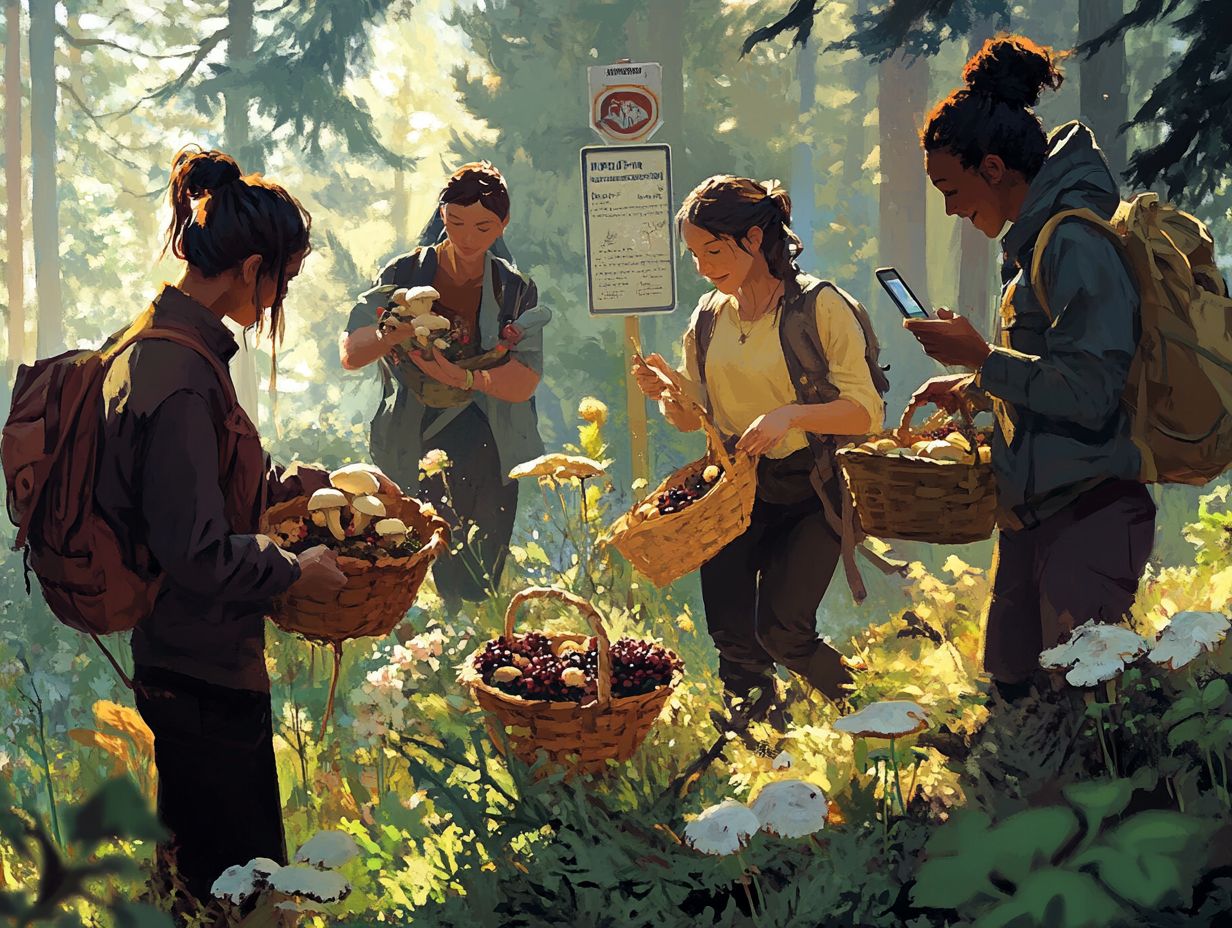
At foraging events, you ll find a delightful array of activities that include guided foraging walks and workshops honing your identification skills. The schedule is thoughtfully designed to balance theoretical knowledge with hands-on experiences, allowing you to immerse yourself in an interactive learning environment.
Along with these enriching activities, you can participate in cooking demonstrations where you’ll discover how to transform your foraged treasures into delectable dishes. Ethical harvesting collecting plants in a way that protects nature is woven throughout the experience, ensuring you grasp the importance of sustainability and respect for the environment.
This harmonious blend of learning opportunities sharpens your skills and cultivates a sense of community. As you share your experiences and insights with fellow participants, you’ll forge lasting connections while collectively celebrating the wonders of the natural world.
Staying Updated on Foraging Events
Don’t miss out on exciting foraging events that can boost your skills and knowledge! Staying updated is essential for you as an avid forager eager to expand your expertise. You can subscribe to newsletters from local foraging organizations, join online groups on platforms like Facebook and Reddit, and follow relevant YouTube channels. Additionally, learning how to use social media for foraging tips can help you access timely information about upcoming workshops and classes tailored for both beginners and advanced foragers alike.
Subscribing to Newsletters and Social Media
Subscribing to newsletters and following social media accounts dedicated to foraging can greatly enhance your awareness of upcoming events and resources. Additionally, learning how to use Meetup for local foraging events can help you discover more opportunities. Many local organizations and online foraging communities regularly share updates about classes, workshops, and ethical foraging practices, helping you connect with nature while promoting sustainability.
By engaging with these platforms, you gain valuable insights into seasonal foraging opportunities, learn about safe practices, and discover new recipes and uses for wild edibles. For instance, following groups like the North American Mycological Association or joining local foraging clubs opens doors to in-person events where experts share their knowledge. Social media accounts run by herbalists and nature educators provide timely tips and fascinating articles that deepen your understanding of the natural world.
Embracing these resources not only broadens your skill set but also fosters a greater appreciation for biodiversity.
Networking with Other Foragers
Networking with fellow foragers is a remarkable way to elevate your foraging skills while building meaningful community connections. Engaging in online groups, attending local meetups, and participating in workshops opens the door to invaluable learning opportunities. Here, you can share experiences and discuss ethical practices in wild food collection, ultimately enriching your foraging journey.
By participating in these gatherings, you can tap into a treasure trove of shared knowledge, discovering new foraging spots and the seasonal availability of various plants. Online forums provide an excellent platform for lively discussions, where you can exchange recipes and explore innovative preparation ideas.
Focusing on ethical foraging practices like identifying and respecting protected species and understanding sustainable harvesting methods nurtures a sense of responsibility within the community. Together, foragers not only sharpen their own skills but also uplift one another, promoting practices that ensure the preservation of natural resources for generations to come.
Frequently Asked Questions
What are foraging events and why should I stay updated on them?
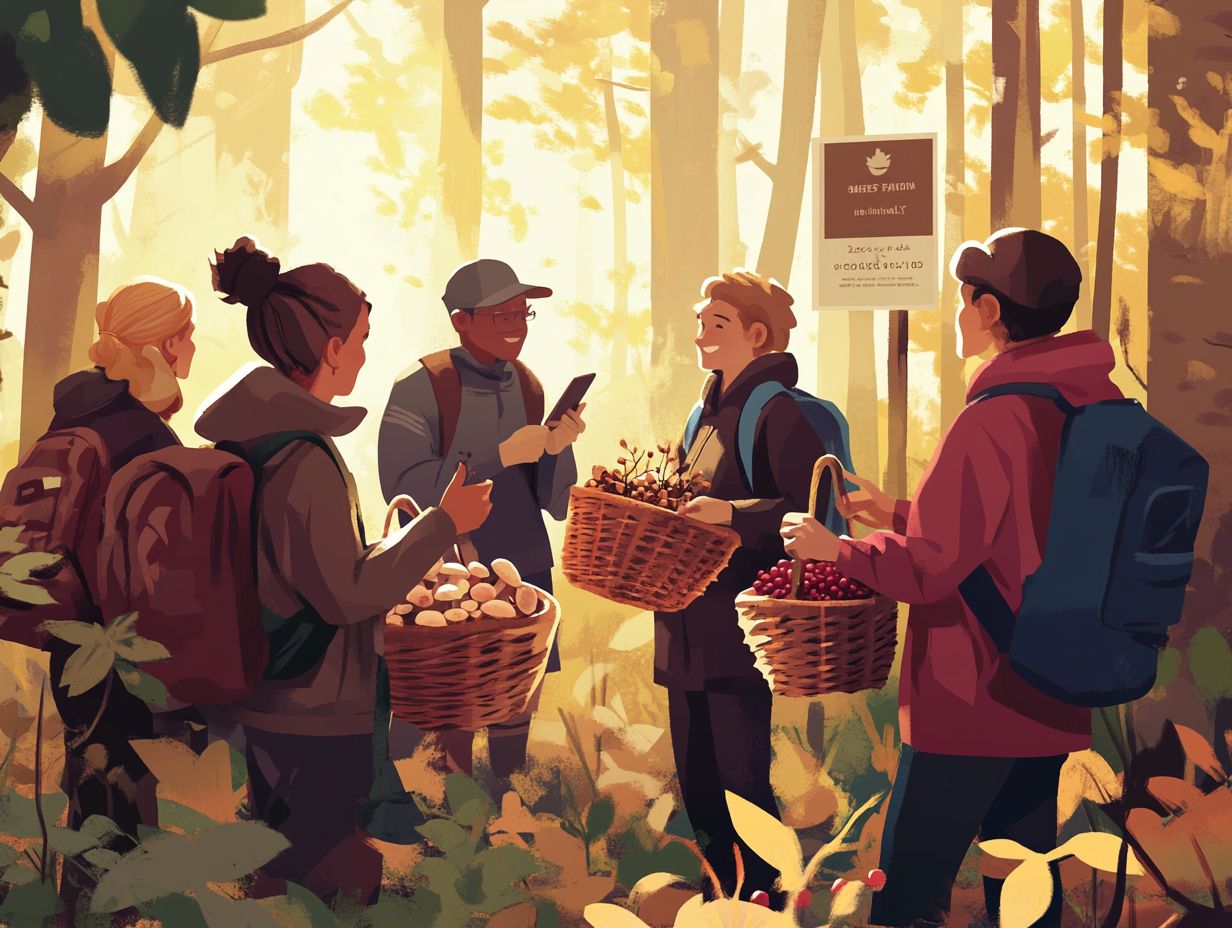
Foraging events are gatherings where people come together to search for and collect wild plants and other food resources. Staying updated on these events can help you discover new foraging spots, learn from experts, and explore volunteer opportunities for foraging enthusiasts to connect with like-minded individuals.
How can I find out about upcoming foraging events in my area?
Follow local foraging groups or organizations on social media to stay updated.
Check community event calendars, join online foraging forums, or speak with local farmers.
Are there any websites or apps specifically for finding and keeping track of foraging events?
Yes! Websites and apps like Falling Fruit, EatTheWeeds, and Wild Harvest are great resources for foragers.
What should I bring to a foraging event?
Bring a small backpack filled with water, snacks, and a first aid kit.
Include foraging tools such as gloves or a basket, and consider a plant identification guide or a camera.
Do I need to have prior foraging experience to attend an event?
No! Most events welcome everyone, regardless of experience.
Some may even offer beginner workshops or have experienced foragers available for guidance.
How can I stay safe while foraging at an event?
Forage responsibly and sustainably. Be cautious when handling plants and aware of potential hazards.
Always follow any guidelines provided by the event organizers.

